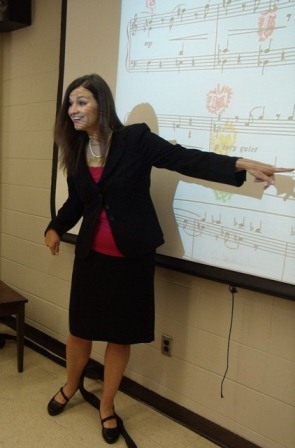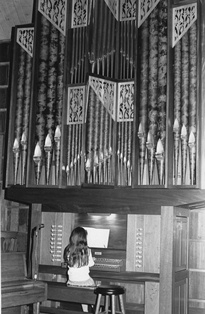by Gillian Ellis

Assistant Professor
Melissa Hoag grew up in a very small town in Missouri. Throughout high school she recalls always knowing what she wanted to do with her life. From an early age, she was passionate about music. She says, laughing, “My whole world was music and everybody knew it.”
But Melissa, OU’s highly regarded Music Theory professor, did not grow up in a musical family. It was chance that uncovered her extraordinary gift. She remembers, “My grandma bought me a little toy piano from Wal-Mart. I still have it.” Seeing how drawn she was to the toy and noting that she would play melodies she’d just heard by ear, her parents decided she should try the real thing, and by age 5 Melissa was taking lessons with a local teacher. “I wasn’t establishing a very good technical foundation, but I loved it and I never wanted to quit.”
Melissa soon had her own piano at home and by age 8, amazingly, she was playing the pipe organ at a large church in her hometown. “I couldn’t reach the pedals,” she says, “but I never had access to the books that included accompaniments, so I improvised accompaniments to the hymn melodies.” She says that such activity allowed her to learn music theory without realizing it, through experimentation and performance, and this prodigious feat earned her an appearance on the television news in St Louis. She continued as organist at the church until she went away to college but changed piano teachers twice in those years, each time moving further afield from her small town to improve the quality of her instruction.
As an undergraduate piano major at Drake University in Des Moines, Iowa, she almost immediately “fell in love with music theory.” And when she pursued her master’s degree and doctorate at Indiana University, it was in the field of music theory, though she continued to study and perform recitals during her graduate studies. In part she says she chose music theory because she was drawn to music beyond the piano repertoire. “Although I love the piano repertoire, I wanted to be able to teach and analyze music from all style periods and for all performing forces. There are no boundaries with music theory. People think of us as the 'rules' people, but teaching theory allows me to communicate connections among and enthusiasm for all kinds of music, which I hope enables my students to perceive similar connections for themselves.”
She carries that philosophy over into her classes at OU, using a wide variety of musical styles and genres to illustrate the theoretical points she makes, so that all music majors will find them relevant to their own repertoire. Melissa has been coordinator of Music Theory since 2007, and she still feels today the same drive to maintain and to continue to experiment with the excellent curriculum that our students need.
Victoria Shively and Michele Soroka also teach theory. “Our department is so lucky to have them,” says Melissa. “They are outstanding teachers and musicians who are dedicated to high standards.” As a team, they never want students to feel that theory is just an exercise or an empty goal, and so they are careful to ensure that students understand why they are learning what they are learning and how it applies to their burgeoning professional lives. Melissa says, “We believe that a thorough knowledge of theory and analysis will deepen their understanding of music, therefore helping them to develop a more interpretive, musical approach to performance and teaching.”

Professor Hoag is always gratified to see her students reach that conclusion themselves and delighted to have advanced theory students move on to graduate school. Naturally she continues her own research and continues to publish and present. She remains fascinated with the work of Brahms who, she says, is “a very rich composer whose music is difficult rhythmically and contrapuntally. His music presents many subtle yet tantalizing issues to the analyst.” Another area of Professor Hoag’s research deals with music theory pedagogy, a topic which relates directly to her work in the classroom. Read more details of Melissa’s research on her
OU bio page.
Most recently, Professor Hoag was asked to become a founding member of the editorial board of Music Theory Pedagogy-Online, which will include numerous resources for music theory teachers as well as an e-journal featuring articles relating to music theory pedagogy.
Visit the site here. For more information about this resource, contact Professor Hoag at
hoag@oakland.edu
Professor Hoag is too busy enjoying her life in music to consider the road not taken. But still it is tempting for us to think what we, as an institution, might have lost if her grandmother had chosen a toy stethoscope instead of a toy piano. On behalf of our grateful music students we thank Professor Hoag’s grandma and her insightful and supportive parents.
Photo: Upper: Professor Hoag in class. Photo by Carly Uhrig.
Lower: A young Melissa Korte plays the huge pipe organ at St Clement Church in her hometown in Missouri.

 Assistant Professor Melissa Hoag grew up in a very small town in Missouri. Throughout high school she recalls always knowing what she wanted to do with her life. From an early age, she was passionate about music. She says, laughing, “My whole world was music and everybody knew it.”
Assistant Professor Melissa Hoag grew up in a very small town in Missouri. Throughout high school she recalls always knowing what she wanted to do with her life. From an early age, she was passionate about music. She says, laughing, “My whole world was music and everybody knew it.” Professor Hoag is always gratified to see her students reach that conclusion themselves and delighted to have advanced theory students move on to graduate school. Naturally she continues her own research and continues to publish and present. She remains fascinated with the work of Brahms who, she says, is “a very rich composer whose music is difficult rhythmically and contrapuntally. His music presents many subtle yet tantalizing issues to the analyst.” Another area of Professor Hoag’s research deals with music theory pedagogy, a topic which relates directly to her work in the classroom. Read more details of Melissa’s research on her OU bio page.
Professor Hoag is always gratified to see her students reach that conclusion themselves and delighted to have advanced theory students move on to graduate school. Naturally she continues her own research and continues to publish and present. She remains fascinated with the work of Brahms who, she says, is “a very rich composer whose music is difficult rhythmically and contrapuntally. His music presents many subtle yet tantalizing issues to the analyst.” Another area of Professor Hoag’s research deals with music theory pedagogy, a topic which relates directly to her work in the classroom. Read more details of Melissa’s research on her OU bio page.